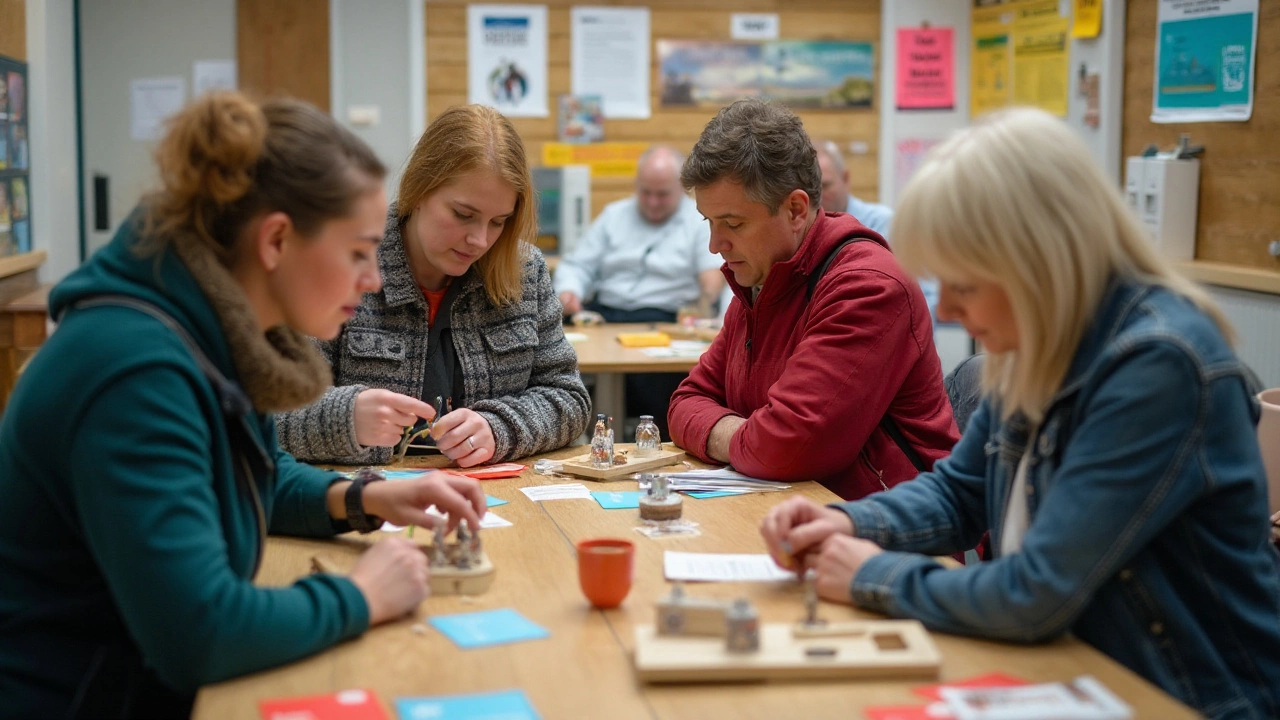As adults, we embark on educational journeys that are often guided by distinct motivations and personalized needs. Unlike our younger counterparts, who may find themselves learners by circumstance, adult learners usually choose their educational paths driven by specific goals. This is where adult learning theory steps in, providing a lens through which we understand how adults absorb knowledge differently.
Delving into the nuances of adult learning theory opens up a world of strategies tailored to adult educative experiences. One of the cornerstone concepts in this realm is andragogy, a theory introduced by Malcolm Knowles, which highlights a shift from traditional schooling methods to strategies that leverage the autonomy and life experiences of adult learners. This approach underscores the importance of seeing adults not merely as recipients of information but as active participants in their learning process.
Moreover, the idea of experiential learning invites adults to learn through experience, encouraging them to draw lessons from real-life applications. This method supports the integration of knowledge into daily practice, making learning both relevant and impactful.
In exploring how adults steer their educational journeys, we recognize the importance of self-directed learning. Here, individuals take charge of what, how, and when they learn, a freedom that aligns with adult learners’ busy lives, full of commitments and responsibilities.
The motivations behind adult education can range from career advancement to personal fulfillment, each carrying its weight in the educational dialogue. These motivations influence the approach educators should adopt to foster a conducive learning environment.
Ultimately, understanding and applying these theories in educational programs transforms how educational experiences are crafted, offering more personalized, practical, and meaningful learning journeys for adults. By appreciating these distinctions, educators can build stronger connections with their learners, enriching the whole educational experience.
- Understanding Adult Learning Theory
- The Importance of Andragogy
- Experiential Learning in Practice
- Self-Directed Learning Journeys
- Motivations Behind Adult Education
- Applying Theory to Educational Programs
Understanding Adult Learning Theory
Adult learning theory is a rich and evolving field that offers insights into how adults acquire, process, and retain information in ways that differ markedly from younger learners. Central to this theory is the recognition that adults are not merely larger versions of children in terms of learning. Instead, they bring a wealth of experiences, self-awareness, and motivations that influence how they engage with new knowledge. This understanding affects the development of instructional strategies designed to capitalize on these attributes, creating a more effective educational environment.
One of the foundational aspects of adult learning is acknowledging that adults are motivated to learn primarily by internal factors rather than external rewards or pressures. They often enter learning situations voluntarily, driven by specific needs such as professional development, personal growth, or the desire to solve problems. This intrinsic motivation fosters a self-directed style of learning, where individuals take responsibility for their education, set their own goals, and manage their progress. Malcolm Knowles, a significant figure in adult education, emphasized these principles through his concept of andragogy, which contrasts with pedagogy – the traditional approach to child education. He highlighted that adults, far more than children, are ready to learn when they experience a need to know or do something to perform more effectively in some aspect of their lives.
Adults also engage in learning with a rich tapestry of personal experiences that form a valuable resource for new educational experiences. This background not only aids in assimilating new information by connecting it to known concepts but also allows them to apply learning in practical, real-world contexts. Here, the theory of experiential learning, as proposed by theorists like David Kolb, becomes relevant. This model stresses learning through reflection on doing, where the acquisition of knowledge is seen as a process where knowledge is created through the transformation of experience. Kolb's theory is often visualized as a cyclical model that encompasses four stages: concrete experience, reflective observation, abstract conceptualization, and active experimentation.
"The learning process does not end when the listener leaves; it continues as they experiment with new behaviors." – David Kolb
In embracing these theories, educators are encouraged to design learning activities that respect the autonomy and respect the rich background of adult learners. This includes creating opportunities for collaborative learning environments where adults can share experiences as a mutual educational resource. It also involves incorporating practical applications and problem-solving scenarios that mimic real-world challenges, thus ensuring the learning is relevant and easily transferrable to one's professional or personal life.
Lifelong learning is a principle deeply embedded in the culture of adult education, advocating for an ongoing pursuit of knowledge and skills throughout an individual's life. Often situated in a changing world where knowledge rapidly expands and becomes obsolete, adults are prompted to return to the classroom repeatedly. Such continuous learning endeavors underscore the necessity for educational models that accommodate and support adult learners' unique attributes. The success of adult education programs, therefore, lies in the ability of educators to harmonize instructional design with the principles of adult learning theory, ensuring education is not only accessible but also profoundly meaningful.
The Importance of Andragogy
Andragogy, a term popularized by Malcolm Knowles in the late 20th century, refers specifically to the method and practice of teaching adult learners. It stands in contrast to pedagogy, the approach traditionally associated with children’s education. Understanding the distinct principles of andragogy is crucial for educators who aim to engage adult learners effectively. One key aspect of andragogy is the recognition that adults bring a wealth of life experiences to their learning environments. These experiences serve not only as a rich resource for the learner themselves but also for their peers within a learning group. This means that adult learning sessions are often collaborative, inviting discussions and exchange of ideas rather than the simple transfer of knowledge. These sessions capitalize on the unique perspectives each learner brings to the table, enhancing the learning experience for everyone involved.
Another pivotal aspect of andragogy is its focus on the learner’s need for autonomy. Adults generally prefer to take responsibility for their learning journey, making them more self-directed than younger students. This self-direction is rooted in a desire to engage with content that is immediately relevant to their personal or professional goals. Hence, effective adult education programs are often flexible, offering choices in how and what adults learn, thus respecting their maturity and self-sufficiency. The self-directed nature of adult learning often results in tailored educational experiences that cater specifically to individual goals and contexts. Such personalization not only ignites motivation but also reinforces the learner’s capacity to integrate new knowledge into their existing frameworks.
Practical application is another principle that underscores the importance of andragogy. Adults tend to be more problem-oriented in their learning approaches. They appreciate learning that is directly applicable to real-world situations. This principle is often embodied in experiential learning activities, which are designed to enable adults to apply theoretical concepts to practice. In this context, learning becomes a process of discovery and synthesis, where theory and practice intersect, equipping learners with tangible skills they can immediately use in their personal or professional lives.
"We ought to think of teaching adults as guiding those who have already taken significant steps along their educational journey. Adults learn best when their experiences are validated and utilized." - Malcolm Knowles
The inclusion of these specific andragogical strategies helps create an environment where adult learners are more engaged and motivated. Since they prefer learning experiences that are relevant to their personal needs, educational programs that adhere to the principles of andragogy often see greater success. Measuring this success can sometimes include statistical evidence, such as increased course completion rates and higher learner satisfaction, indicating the effectiveness of andragogical methods over traditional pedagogical approaches.

Experiential Learning in Practice
Experiential learning is a dynamic and pragmatic approach that resonates deeply within the realm of adult education. At its core, it is about immersing learners in a cycle where they can engage with and reflect upon their experiences to gain valuable insights. Created by educational theorist David Kolb, this framework is built upon the idea that knowledge is generated through the transformation of experience. It's more than just hands-on learning—it's an intentional process that empowers learners to apply theoretical concepts in practical, real-world contexts.
This learning model involves four stages: concrete experience, reflective observation, abstract conceptualization, and active experimentation. Adult learners, when navigating through these stages, find themselves in situations that demand the application of concepts and skills in a manner that theory alone could never encapsulate. Let's say a learner is tackling a project in a new field; they start with a concrete task, observe their process and results, theorize improvements, and finally, test those theories in the next iteration. This cycle not only enhances their understanding but also builds confidence and competence.
"Learning is the process whereby knowledge is created through the transformation of experience" - David A. Kolb
One intriguing application of experiential learning is in leadership training. Companies increasingly rely on experiential methods like role-playing simulations to cultivate leadership skills. Imagine a scenario where managers engage in simulations that mimic challenging workplace situations. By actively participating, they gain insights into their decision-making processes and their impacts. This approach leads to robust learning experiences because participants are not just passive recipients of information but are, instead, active creators of their understanding.
Experiential learning’s significance is vividly seen in the expanding field of healthcare. Medical students worldwide use simulation labs and real patient interactions to hone their skills. Through these experiences, they learn to manage unexpected challenges, communicate effectively with patients, and work under pressure, thereby improving clinical competency. Importantly, these real-world engagements foster empathy and a deeper understanding of the patient experience, skills that are paramount in successful healthcare delivery. A 2020 study published in the Journal of Medical Education found that students engaged in more experiential forms of learning were better prepared for their residencies, scoring significantly higher on key assessments compared to their peers who relied solely on traditional lecture-based formats.
In the grand tapestry of adult education, experiential learning stands out not only for its effectiveness but for its ability to ignite a passion for lifelong learning. Whether in the context of formal education, workplace training, or personal development, embracing this approach offers adults a chance to learn by doing, reflect on what they’ve learned, and then take tangible steps toward improvement. This method sets the foundation for continuous growth, allowing adult learners to navigate the intricacies of a rapidly evolving world with adaptability and insight.
Self-Directed Learning Journeys
In the realm of adult learning, one principle stands out for its emphasis on autonomy and personal responsibility: self-directed learning. At its core, this approach recognizes the mature learner's capability and desire to take charge of their educational path. Unlike traditional, structured educational systems where instructors orchestrate every learning detail, self-directed learning allows individuals to be at the helm, steering through the vast ocean of knowledge according to their interests, needs, and life challenges.
Self-directed learning journeys combine different elements, such as setting personal goals, choosing pertinent learning resources, and continuously assessing one’s progress. In this context, adult learners often become their own educators, curating knowledge that is deeply relevant and aligned with their aspirations. This method not only nurtures a profound sense of ownership over one’s education but also cultivates critical thinking and problem-solving abilities. For instance, an adult pursuing new skills to pivot careers might start with defining clear objectives: gain proficiency in digital marketing within six months.
Such learners usually create a customized curriculum, sourcing materials from online courses, books, and webinars, alongside real-world practice. They actively evaluate their knowledge. This iterative feedback loop enhances learning efficacy, making it infinitely more rewarding than passive consumption of information. Just as the 1991 work by educator Malcolm Knowles suggested, adults thrive when they are able to learn by doing and connect theory with practical application. Knowles emphasized that
adults need to be involved in the planning and evaluation of their instruction, a core tenet of self-directed learning.
As technology advances, tools like learning management systems and educational platforms have made self-directed learning more accessible and personalized. The internet serves as a fertile ground for knowledge, providing countless resources that can be tailored to suit individual learning styles, whether through video lectures, interactive modules, or peer discussions. A unique aspect of self-directed learning is the ability to harness community wisdom. Platforms such as forums and social media groups enable learners to engage in dialogue with peers and experts, enhancing understanding through shared experiences and collective problem-solving.
Nevertheless, self-directed learning is not without its challenges. It demands discipline and intrinsic motivation, which can be daunting for some. Time management often emerges as a crucial skill for these learners, as they must balance learning with other life responsibilities. According to a study, self-directed learners excel when they set specific timelines for accomplishing learning goals, breaking them into manageable, actionable tasks. Utilizing techniques from project management can therefore be invaluable. Tools like calendars and task apps play a significant role in keeping learning journeys on track and preventing procrastination.
As adult education increasingly embraces self-direction, institutions and educators are shifting from being traditional information dispensers to facilitators, offering guidance and support while encouraging learners to navigate their learning paths independently. Courses are designed with flexible modules that cater to different paces, allowing learners to focus on content that best suits their interests and career goals. In essence, self-directed learning is not merely an educational strategy but a lifelong skill, empowering individuals with the confidence and competence to adapt continually in an ever-evolving world.

Motivations Behind Adult Education
The journey of adult learning is rich and multifaceted, driven by a variety of motivations that differ widely from traditional education routes experienced during youth. At the heart of these motivations is a profound desire for self-improvement and the enhancement of one's current abilities or knowledge base. Adults often return to the learning environment seeking education theory that offers practical benefits, whether it be for advancing their career, changing paths, or simply acquiring new skills for personal satisfaction.
One major driving force is the evolving job market. With technology advancing at breakneck speed, industries are in constant flux, leading many professionals to reskill or upskill in order to stay relevant. This can be seen in the increasing enrollment in tech courses or digital literacy workshops by individuals seeking to bridge the gap between their existing capabilities and the tech-savvy demands of modern workplaces. The Bureau of Labor Statistics suggests that individuals who engage in continuous learning and development often experience increased job security and opportunities for advancement.
"The beautiful thing about learning is that nobody can take it away from you," a sentiment famously expressed by B.B. King, encapsulates the enduring value that learning provides, a truth universally acknowledged by adult learners.
Beyond professional development, the motivation for personal enrichment plays a crucial role. Many adults pursue education not just for career progression but for the joy of learning itself, driven by curiosity and the desire to explore new areas of interest. This intrinsic motivation is greatly supported by structured learning environments that offer courses in diverse subjects such as language, arts, and even practical projects like gardening or cooking, which weave education seamlessly into everyday life.
Social and personal factors also weigh heavily into the equation. Many adults find themselves returning to education to set a positive example for their children, demonstrating the importance of lifelong learning. Others might be influenced by a changing personal situation, such as recovering from an illness or starting over after a significant life event, which galvanizes them to embark on lifelong learning journeys. These motivations often resonate with a deep-seated need for personal growth and the recognition that learning is not a phase but an ongoing process.
Facilitating such motivations are adult education programs designed to be flexible and accommodating, catering to the unique life constraints of adults who juggle multiple roles. These programs often incorporate distance learning or flexible scheduling, allowing for education to fit within the unpredictability of adult life. Understanding these motivations can aid educators in designing more responsive and engaging adult education opportunities that speak directly to the learners' goals and aspirations.
To quantify the impact of motivations behind adult education, a 2022 survey by the National Center for Education Statistics highlights that learners in adult education programs have a 23% higher chance of improved job performance and career satisfaction. This correlation between continued learning and personal and professional achievement underscores the substantial benefits drawn from the pursuit of knowledge, whether motivated by necessity or passion.
Applying Theory to Educational Programs
Transforming educational theories into practice is a challenge that educators often face head-on, particularly in the realm of adult learning. When we consider the diverse backgrounds and unique motivations that adult learners bring to the classroom, integrating education theory into programs becomes essential yet intricate. To begin with, a successful application of these theories involves creating a learning environment that acknowledges and leverages the distinctive experiences adults bring with them. By doing so, educators can craft lessons that resonate on a personal level, engaging the learner far beyond the confines of traditional education.
An illustrative example of this is in adapting Malcolm Knowles' principles of andragogy into a real-world setting. One of the key tenets is the need for adults to understand why they need to learn something before they are willing to invest their time and effort. Educators can embed this idea into their programs by clearly outlining learning objectives and providing context as to how the knowledge or skill will be applicable in real-life scenarios. This relevance serves as a motivational catalyst, fostering a sense of purpose in the educational journey.
"The illiterate of the 21st century will not be those who cannot read and write, but those who cannot learn, unlearn, and relearn." - Alvin Toffler
Experiential learning, another cornerstone of adult education theory, plays a central role in curriculum development. This approach encourages learning through doing, grounding knowledge in practical experience. A study by the National Center for Education Statistics shows that almost 70% of adults who participate in learning activities prefer those that involve hands-on experiences. Incorporating simulations, role-playing, and problem-based learning can transform theoretical knowledge into practical skills. By aligning the curriculum with real-world applications, educational programs become more effective at preparing learners for contemporary challenges.
Perhaps equally crucial is acknowledging the self-directed nature of adult learning. Often, adults engage in educational programs amidst a myriad of other responsibilities, from work commitments to family duties. Thus, providing a structure that allows flexibility in how and when learning occurs is essential. Online modules, for example, allow learners to progress at their own pace, revisiting concepts as needed. According to a report by the Online Learning Consortium, 85% of adult learners appreciate the flexibility of online learning as it aptly fits around their schedules. This adaptability is not just a convenience but a necessity in accommodating adult learners' diverse lives.
Motivation is another significant factor influenced by the proper application of theories. Understanding that adult learners often pursue education voluntarily, driven by personal or professional growth, educators can tailor their programs to align with these motivations. Programs that recognize and support these aspirations, perhaps through personalized learning paths or mentorship opportunities, can significantly enhance learner satisfaction and achievement. This alignment is vital for emphasizing the transformative power of education in an adult’s life.
In summary, applying adult learning theories effectively requires a thoughtful blend of acknowledging learners’ past, addressing their present needs, and preparing them for future challenges. It demands educators not only teach but also facilitate an environment where adult learners can thrive, merging theory with practical and purposeful application. Such educational programs not only impart knowledge but also uphold the dignity of adult education as a continuing journey of growth and discovery.






